/ MEDIA STATEMENT / The content on this page is not written by Polity.org.za, but is supplied by third parties. This content does not constitute news reporting by Polity.org.za.
The South African Democratic Teachers’ Union (SADTU) celebrates its 26th anniversary on the 6th of October.
SADTU was established in 1990, in the presence of Nelson Mandela, following a directive from the ANC under teacher Oliver Tambo given in the late 1980s during the preparation of the famous Harare Declaration.
We have grown from a union of 30 000 members in 1990 to 250 000 members today. This represents a 2/3 majority of teachers in our country. We are moving away from being a craft union as we are now organising everybody employed in the education sector.
Our union was formed following unity talks among professional teacher bodies and associations across racial, ethnic, geographical and education authorities.
The process to unite these teachers from such vast backgrounds was assisted international labour federations, COSATU and the ANC.
This saw the birth of a unitary, democratic, non-racial and non-sexist union to unite teachers and fights not only for teachers’ rights but for free quality public education as well.
Our short history of 26 years may account on the following achievements:
1. It is our union (SADTU) that fought for the recognition of teachers’ union in South Africa
2. It is SADTU that fought for collective bargaining in our sector - hence the establishment of the ELRC in 1993 long before a bargaining forum for public servants (PSCBC).
3. We fought for the right and appreciation of women as equals to their male counterparts in terms of conditions of service and salaries.
4. We fought for the protection of the natural right of women to give birth at no risk of losing their jobs; hence they enjoy 4 months paid maternity leave. Giving meant termination of service for many female teachers.
5. It is our union that fought the stupid authoritarian policy of inspection, which harassed, victimised and deprofessionalised our profession.
6. We opposed an attempt to make education an essential service; we stopped the abuse of R400 million for biometric machine.
7. We continue opposing the privatisation of education as it is a basic human right.
8. We opposed ANA and any testing system meant to convert our learners to uncritical robots.
The early years of SADTU were marked by the struggle for recognition. Many strikes were waged and these secured the right to organise, form and join the union of choice, right to fair procedure and the right to negotiate.
In the 1995 Congress, the Union resolved to redouble its efforts towards professional development and education policy work and to devote resources to this end.
This is evident in the themes the Union has adopted in all the eight congresses we have had since inception. They stress the importance of organising and empowering education workers to deliver quality public education.
They further strengthen our resolve as nation builders as they put emphasis on repositioning the union for people’s education for people's power in building and pursuit of socialism.
Our focus on socialism is a clear indication of the Union’s political vision, which recognises that although we may have political freedom, we have not yet attained social and economic freedom.
In 2010, we launched the Union’s 2030 Vision to help us to achieve our goals.
The Vision is based on five pillars:
- Servicing the Union Member
- Creating a Learning Nation
- Promoting a development-oriented nation state
- Creating international partnerships
- Building a delivery based organisational capacity.
In line with our Vision’s Pillar 1: Servicing our members – we have established our own institute. The Curtis Nkondo Professional Development Institute was launched in 2013 and has since trained more than 80 000 members.
We as SADTU demand the teaching of the full, partisan history of the South African liberation struggle in our schools, now and forever.
Loving our culture, we demand the teaching of children in their home language. Hating Bantu education, we demand a full education and not a second-rate education, for all, whether it be in maths and science, or in the humanities, or in music, dance and drama.
The South African Democratic Teachers’ Union is still on a mission. It refuses utilitarian education. Once again, we refuse a substitute for education that consists of markers, tests and rote learners.
The South African liberation struggle is not ended. It is still a work in progress.
As we celebrate our 26th anniversary we are fully aware of the many attempts to tarnish our name and to render this gallant union irrelevant.
The Ministerial Task Team Report was one of the many tactics used to drag our name in the mud. We were accused of selling posts but nowhere in the report was it ever stated that SADTU ever sold posts. To those who sold posts in our name, we called on the law to take its own course.
Despite these attempts, our teachers continue to swell our ranks.
We celebrate our anniversary a day after the World Teachers’ Day and a day before 7 October – International Decent Work Day. We support COSATU’s call for a one-day strike as part of commemorating this day and their demands for the following:
- A total ban of labour brokers;
- The scrapping of the e-tolling system including the expensive toll gates;
- Fight in defence of our jobs and against retrenchments;
- The implementation of the Legislated National Minimum Wage;
- Fight to defend and protect our Collective Bargaining Agreements;
- Fight for compliance with Occupational Health and Safety Standards in all workplace;
- Fight for the implementation of the NHI;
- Fight for the scrapping of the Taxation Amendment Law;
- Demand the implementation of Free Higher Education for the poor;
Issued by SADTU
EMAIL THIS ARTICLE SAVE THIS ARTICLE
To subscribe email subscriptions@creamermedia.co.za or click here
To advertise email advertising@creamermedia.co.za or click here











